Are you thinking about living in Dubai as an expat, but don’t know where to start? Home to over 80 percent expatriates, Dubai offers a diverse and exciting lifestyle—plus excellent job prospects.
This guide gives you clear insights on costs, housing choices, cultural tips, schools and more—to make your Dubai move easy for 2025. Read on for essential tips before relocating to Dubai!
Key Takeaways
Living in Dubai can get expensive, especially housing—which eats up around 30% of monthly budgets. Renting a one-bedroom apartment downtown sets you back about AED 8,175 ($2,226) per month.
Over 80% of Dubai residents come from other countries, making the city vibrant and diverse. Many expat families choose international schools, often teaching British, American, or International Baccalaureate curricula.
Popular neighborhoods among expats include Dubai Marina for young professionals, Arabian Ranches for families, and Palm Jumeirah if you’re after luxury.
Dubai offers three main work visas: the Standard Visa for 2 years, the Green Visa lasting 5 years, and the Golden Visa good for 10 years. Your Emirates ID card acts as your primary identification in Dubai.
International school tuition ranges greatly—from AED 8,000 ($2,177) per year at budget-friendly schools—to AED 100,000 ($27,225) annually at top-tier institutions—depending on reputation and chosen curriculum.
Table of Contents
Cost of Living in Dubai
 Dubai’s cost of living hits your wallet in specific ways. Money matters most when you plan your move to this glitzy desert city.
Dubai’s cost of living hits your wallet in specific ways. Money matters most when you plan your move to this glitzy desert city.
Rent and housing expenses
Housing in Dubai can quickly eat into your budget. On average, expats in Dubai spend about 30% of their total monthly expenses solely on housing. A one-bedroom apartment located right in the city center goes for roughly AED 8,175 ($2,226) per month.
Moving outside central neighborhoods reduces costs—with rent dropping to around AED 5,089 ($1,386) for the same size place. Families who need extra room and opt for a three-bedroom apartment will pay AED 15,267 ($4,156) monthly if choosing to stay central.
But the same apartment further out is cheaper, running about AED 10,014 ($2,726). Always keep your Emirates ID close by—it is required for signing any rental contracts.
Dubai real estate: where luxury meets necessity, and your budget meets reality.
Apart from rent, expect regular utility expenses as another housing-related cost in Dubai. Monthly utility bills for a regular one-bedroom place typically range between AED 400 and AED 800 (about $110 to $220).
This covers basics like electricity, cooling, water usage, and garbage removal. Popular expat neighborhoods such as Dubai Marina and Jumeirah Village are favorites due to their affordable prices combined with good amenities.
Before committing to your lease, confirm with your landlord if they prefer standard bank transfers or post-dated checks—as many landlords in Dubai still ask for checks. Many newcomers choose investment-friendly apartments in Dubai’s residential complexes as comfortable starting places in the city.
Transportation costs
Dubai makes travel easy for expats, offering plenty of ways to get around. Gas prices sit at roughly AED 2.63 per liter, which makes driving pretty affordable. Taxi rides begin at AED 12.00, with each extra kilometer adding AED 2.50 to your fare.
For cheaper trips, public transportation tickets cost around AED 4 to AED 8.50 one way, depending on distance. Regular public transit users, especially commuters, can save cash with monthly passes—AED 140 covers a single travel zone, while AED 350 grants access to all zones within the UAE.
Just keep your Emirates ID or passport handy; you’ll need it to pick up a monthly pass.
Owning a vehicle brings extra costs but provides more flexibility. A new Toyota Corolla goes for about AED 74,900, meaning typical loan payments come in at AED 14,076 annually over five years.
A lot of expats prefer ride-sharing apps, such as Careem, for quick trips around town and save their cars for weekends or longer drives. The Dubai Metro connects major neighborhoods like Dubai Marina and stops close to popular spots like the Burj Khalifa, offering a smart alternative to rush-hour traffic.
Utility and internet bills
Expats living in Dubai can manage monthly utility costs without much strain. Water and electricity bills for a one-bedroom apartment generally range from AED 400 to AED 600 each month.
In my building, neighbors and I often share expenses, especially during hot summer months when air conditioning use rises. Internet and TV bundles usually cost around AED 300 to AED 500 monthly, with popular providers like Etisalat and du offering flexible plans.
Monthly mobile phone bills can run anywhere from AED 200 to AED 500, depending heavily on personal usage. Landlords typically ask tenants to open a Dubai Electricity and Water Authority (DEWA) account right after they sign the rental agreement.
Payments can be conveniently managed through direct debit or using DEWA’s own app, making monthly expense tracking simple.
Grocery and dining costs
Once you’ve sorted your utilities, food budgeting in Dubai is the next step. Grocery costs can differ widely, depending on your personal shopping style and habits. For a single guy living in the UAE, grocery expenses usually range between 1,200 and 2,700 AED every month.
Essentials such as bread, rice, and eggs will usually run you about 200 to 400 AED monthly. Fresh fruits and veggies typically add another 300 to 600 AED, while dairy items cost another 200 to 400 AED—depending on your tastes.
Dubai offers everything from budget meals to luxury dining experiences – your wallet decides the experience.
Eating out can also fit many budgets in Dubai. Fast food meals range between 20 and 40 AED—ideal for grabbing lunch on-the-go. Mid-level restaurants average around 50 to 80 AED per meal, decent food without breaking your wallet.
Areas like Dubai Marina and Palm Jumeirah boast fantastic places to eat, complete with beautiful views and atmosphere. To keep expenses under control, many foreign residents mix eating at home with an occasional restaurant meal.
Smart shoppers stretch their food budgets by buying from local markets, where prices are often lower and quality remains high.
Accommodation Options for Expats
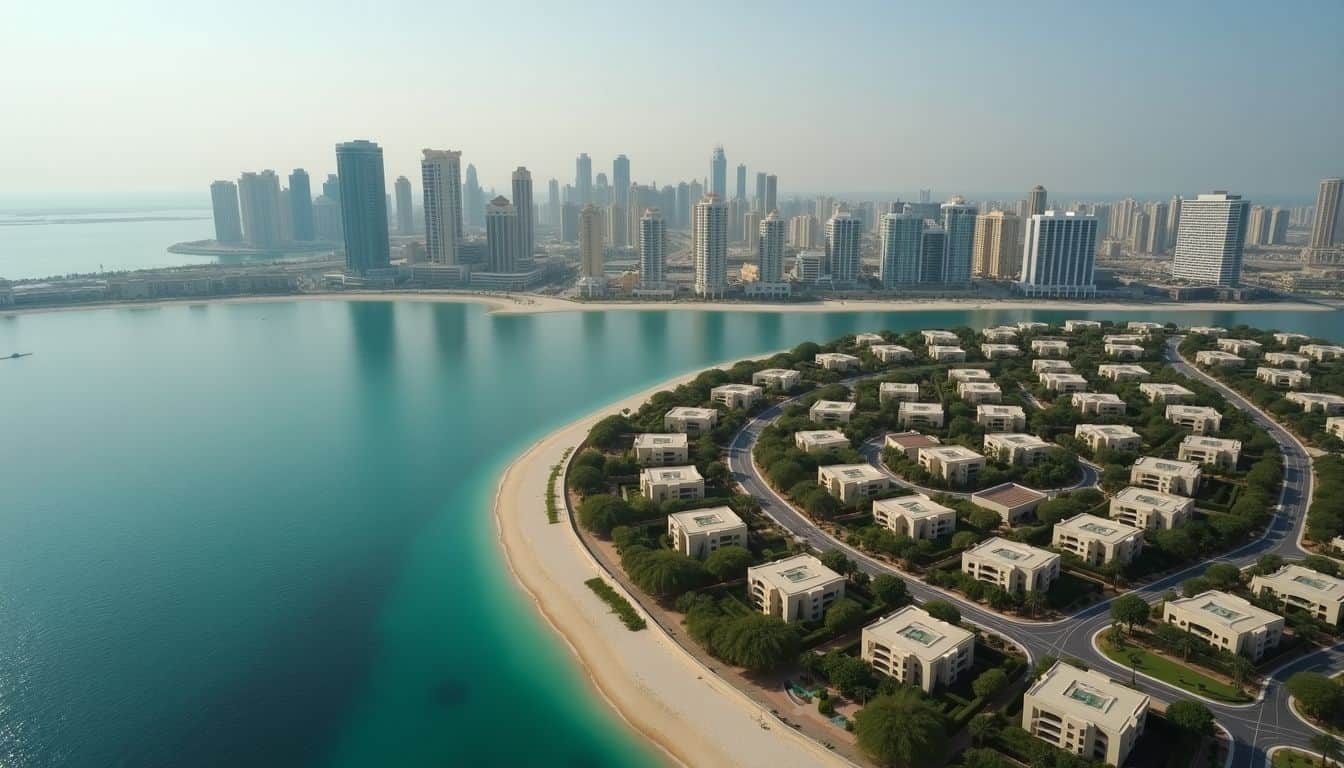
Dubai offers expats a wide range of housing choices from luxury high-rise apartments in Dubai Marina to spacious villas in Arabian Ranches – find out which neighborhood fits your lifestyle and budget as we explore your best options for setting up home in this vibrant city.
Renting vs. buying property
Renting a home in Dubai offers expats plenty of freedom—perfect for folks on temporary work contracts. You won’t need a large upfront investment, just the security deposit and one month’s rent.
Plus, monthly payments stay the same, making budgeting simple and predictable. Lots of expats prefer renting while they get familiar with the UAE housing market or if relocation might come up again soon.
Buying property can add great advantages to your Dubai lifestyle. The city’s real estate market has steadily grown in value over the years, helping boost your wealth through equity.
But ownership demands a heavier upfront commitment, such as a sizable down payment and various closing fees. You’ll also need to obtain an Emirates ID and carefully follow UAE’s foreign ownership laws.
Popular neighborhoods like Dubai Marina and Jumeirah Lake Towers attract many expat buyers searching for stable, long-term investments.
Popular neighborhoods for expats
After choosing between renting and buying, the next step is finding a neighborhood that suits your lifestyle. In Dubai, expats have plenty of great neighborhoods to choose from—each offering distinct advantages.
- Downtown Dubai is popular with expats due to its upscale housing and central spot near the iconic Burj Khalifa. The area brims with lively entertainment venues and puts residents at the heart of city life.
- Dubai Marina is a favorite of single expats and young professionals looking for an exciting urban vibe. With waterfront residences boasting incredible views, this area offers buzzing nightlife, trendy cafes, and plenty of outdoor activities.
- Arabian Ranches appeals strongly to families needing extra room to spread out in a quieter neighborhood. Spacious villas, lush parks, and kid-friendly amenities make it an ideal spot for raising kids.
- Palm Jumeirah provides expats with an unmatched island lifestyle on a famous man-made island full of luxury residences. Homes here feature private beaches, renowned restaurants, and upscale hotels just steps away.
- Al Barsha gives expats budget-friendly housing options with apartment buildings and villas at more reasonable prices. Conveniently located near the Mall of the Emirates, shopping trips and entertainment outings are hassle-free.
- Jumeirah Lake Towers (JLT) attracts expats employed at Dubai Media City and Dubai Internet City, thanks to its strategic location. High-rise apartment buildings surround serene artificial lakes, with a mix of casual and upscale dining options nearby.
- The Greens offer a relaxed atmosphere with attractive mid-priced apartments set around pleasant green spaces. Many expats from Western countries appreciate the pedestrian-friendly walkways and easy outdoor access.
- Business Bay draws career-focused expats who want the convenience of modern housing close to Downtown, but at better prices. The area provides sleek apartments and easy commuting to offices throughout the city.
Types of housing available
Dubai’s housing market provides a wide mix of home choices suitable for expats with various budgets and lifestyles. Here’s a practical rundown of the main property types available:
- Luxury Apartments – Dubai offers upscale living in well-known buildings like Burj Khalifa or Emirates Crown. These high-rise apartments usually feature gyms, pools, concierge staff, and stunning city views. Expats often prefer them due to closeness to popular attractions like Dubai Mall and downtown amenities.
- Standard Apartments – Decent and affordable options you can rely on. A typical one-bedroom costs AED 7,000 to AED 10,000 per month, while two-bedroom units range from AED 12,000 to AED 18,000 monthly. You’ll find many available apartments, particularly in areas like Dubai Marina, offering solid value and convenience.
- Villas – These standalone homes are common picks for families needing extra space and privacy. Villas usually have yards, private pools, and larger rooms perfect for hosting friends and family. Most villas are located in quieter suburban neighborhoods.
- Townhouses – Offering a nice blend between apartments and villas, townhouses give you extra square footage at a lower price than standalone properties. They generally include modest garden spaces or small yards and provide a comfortable middle-ground living option.
- Serviced Apartments – Ideal for newcomers or short-term stays, these furnished apartments come with hotel-like features such as daily housekeeping, laundry service, and utilities. They simplify your relocation process and help you adjust quickly to Dubai life.
- Staff Housing – Some companies in Dubai offer employee housing as part of their contracts. Quality and location of this housing type vary greatly, depending mainly on your job level or employer.
- Shared Accommodation – Renting just one room within a larger home saves money and appeals mostly to younger employees starting their life in Dubai. It’s an easy and budget-friendly way to settle into the city.
- Penthouses – On the highest floors of luxury towers, penthouses represent Dubai’s premium living. They provide spacious interiors, high-quality finishes, and breathtaking panoramic city views. These exclusive properties deliver exceptional comfort and status.
Employment and Work Culture

Dubai’s job market offers rich chances in finance, tech, and tourism for skilled expats. The work culture blends Western business styles with local customs, making it vital to learn proper office etiquette before you start.
Popular industries and job opportunities
The job market in Dubai is thriving, especially in six key fields: IT, healthcare, teaching, construction, sales, and finance. From my own experience working five years in the city’s tech industry, I noticed these sectors stayed strong, even after COVID-19 hit.
The healthcare industry is expanding rapidly, driven by Dubai’s rising population, and needs skilled professionals to fill the gaps. Many expat workers land jobs through online platforms—like Gulf Talent—or through local recruiting agencies.
The UAE job market rewards specialists who bring unique skills to growing sectors.
Tourism and hospitality roles remain plentiful, especially around Dubai International Airport (DXB), as well as in high-end hotels, which frequently recruit new staff. The government’s recent Golden Visa program encourages talented professionals to remain in the UAE longer.
Tech workers with experience in AI or cloud computing earn high salaries—often paid in UAE dirhams without any income tax. Expats regularly find better opportunities through face-to-face networking at local business events, instead of only relying on online job applications.
Corporate culture in Dubai
Dubai’s job market offers a fresh perspective on corporate culture, mixing Emirati traditions with global business methods. This fusion shapes a workplace where respecting local customs is as vital as hitting business targets.
During my stay near Dubai Marina, I noticed office hours run longer than back home—typically from 8 AM until around 6 PM. Professionals here often put in extra effort, regularly checking emails outside of office hours.
In Dubai, career success often relies heavily on personal relationships. Deals frequently flow through informal networks rather than official channels. Your Emirates ID acts as a gateway into these professional circles.
Companies in Dubai now actively support workplace diversity, with clear legal guidelines to ensure fairness. Islamic traditions influence certain work routines, including scheduled prayer breaks and religious holidays.
Adapting to these local expectations often helps expats advance faster in Dubai’s lively job environment.
Work visa requirements for expats
Securing a work visa for the UAE means knowing the available options clearly. Expats generally choose from three main visa types: Standard Work Visa valid for two years, Green Visa valid for five, and Golden Visa lasting up to ten.
Each comes with its own set of advantages for people relocating to Dubai. Applicants must be at least 18 years old and fulfill basic education criteria. The application process involves approval of quotas from local authorities and passing required medical exams.
Expats typically depend on employers to sponsor their visas. Green and Golden visas give more independence to highly skilled workers or specialized experts. Once approved, keep the Emirates ID card safe—it serves as your primary identity document throughout your stay.
Education and Schooling

Dubai offers top-notch education for expat families with over 200 international schools to choose from. Parents can select from British, American, IB, and other curriculums while KHDA ratings help gauge school quality and standards.
International schools in Dubai
International schools in Dubai deliver top-tier education, ideal for expat families, through diverse global curriculums and high-quality teaching standards.
- The city features over 200 private schools, serving expat communities worldwide—primarily following British, American, IB, and other international curricula.
- Among these, Repton School stands out for excellent academic results in its British curriculum; the campus boasts modern science labs, spacious sports areas, and well-equipped arts centers.
- Kings School appeals to parents wanting strong academics plus plenty of extracurricular involvement; their campuses offer swimming pools, tennis courts, and dedicated music studios.
- Dubai College maintains a solid reputation, thanks largely to impressive university placement rates; most students secure spots at leading universities in the UK, the US, and Australia.
- GEMS Wellington International School provides the IB program, emphasizing a well-rounded education approach that mixes academics, sports, arts, and community involvement.
- Annual fees vary greatly—from AED 8,000 ($2,177) to AED 100,000 ($27,225)—depending on curriculum choices, grade level, and a school’s reputation.
- Private international schools represent 90% of educational institutions within Dubai, reflecting the city’s sizable expat community and strong international school demand.
- The Knowledge and Human Development Authority (KHDA) oversees all private schools in Dubai, conducting yearly inspections and releasing ratings, making school selection simpler for parents.
- Admission to popular schools commonly involves entrance tests, interviews, and reviews of previous school records; places get taken quickly, so applying early is key.
- International schools typically deliver strong English language instruction alongside Arabic classes, with additional languages like French, Spanish, German, and even Mandarin frequently offered.
- Sports amenities usually include Olympic-sized swimming pools, soccer fields, and indoor gyms; students often participate in local and regional sporting competitions.
- Schools regularly integrate technology tools such as smart boards, computer labs, and coding sessions; this ensures students build digital abilities from an early stage.
School curriculums and fees
Now that you understand the international school landscape, let’s break down the educational programs and costs you’ll encounter in Dubai. Schools offer diverse curriculums to match your family’s needs and future plans.
| Curriculum | Annual Fee Range (AED) | Annual Fee Range (USD) | Key Features |
|---|---|---|---|
| British (GCSE/A-Levels) | 25,000 – 100,000 | $6,800 – $27,225 | Focus on critical thinking, traditional subjects, GCSE exams at 16, A-Levels at 18 |
| American | 35,000 – 85,000 | $9,530 – $23,140 | Credit-based system, SAT prep, AP courses, high school diploma |
| Indian (CBSE/ICSE) | 8,000 – 25,000 | $2,177 – $6,800 | More affordable option, strong math/science focus, board exams in grades 10 and 12 |
| International Baccalaureate (IB) | 45,000 – 100,000 | $12,250 – $27,225 | Global recognition, inquiry-based learning, Theory of Knowledge course, CAS activities |
| French | 30,000 – 65,000 | $8,170 – $17,700 | French language instruction, Baccalauréat diploma |
| German | 35,000 – 70,000 | $9,530 – $19,060 | German language focus, Abitur qualification |
Money plays a major role in school selection for most expat families. The price range varies greatly from AED 8,000 ($2,177) at budget Indian schools to AED 100,000 ($27,225) at premium British or IB institutions. Many schools charge extra fees for registration, uniforms, books, technology, and transportation.
School fees often increase by grade level, with high school costing more than elementary education. Most schools require term payments, with some offering monthly plans at an added cost. Early registration can sometimes secure discounts of 5-10%.
Your research should go beyond fees. Consider your child’s learning style, your stay duration in Dubai, and which curriculum best aligns with future education plans. Visit multiple schools, ask about teacher qualifications, and examine facilities before making this crucial decision.
Special needs education options
Dubai offers great resources for expat families who have children with special needs. The city has established numerous schools with programs created specifically for students with disabilities.
Each school provides individualized support, carefully matched to each child’s unique needs. My son has autism and thrived at GEMS FirstPoint School, where teachers adapted lessons to fit his personal learning style.
By 2025, Dubai intends to further grow these services, giving expat families more high-quality educational choices. These expanding programs demonstrate the UAE’s commitment to inclusive education.
Families moving to Dubai with children who require extra support will find welcoming schools, ready to help their kids succeed.
Healthcare in Dubai

Dubai’s healthcare system blends top-notch private clinics with public options, making medical care easy to access but vital to understand before you need it – read on to learn about insurance rules, finding the right doctors, and how to navigate medical services as an expat in this desert metropolis.
Public vs. private healthcare
Dubai residents have two main healthcare choices. Public hospitals, managed by the UAE government, primarily serve Emirati citizens. These hospitals offer quality care at affordable prices—but expats generally face longer wait periods.
Last year, I needed a quick check-up and had to wait three weeks for an appointment. On the other hand, private hospitals target Dubai’s large expat community, providing shorter waits and English-speaking staff.
But convenience comes at a price: expect higher costs for everything—from routine check-ups to major surgery.
Your Emirates ID and health insurance status play a big role in deciding your healthcare options. Having health insurance in Dubai is mandatory by law—you can’t avoid it. Many jobs come with basic coverage, although sometimes you’ll need extra benefits for certain treatments.
Private hospitals, like Mediclinic and Saudi German Hospital, feature advanced equipment and excellent doctors but charge noticeably higher fees. Public hospitals, such as Rashid Hospital, are usually more budget-friendly but, be prepared, they often come with longer waiting periods.
Health insurance requirements
Health insurance is mandatory for every resident in Dubai. You simply can’t get your visa processed without it—there’s no way around this rule. UAE law clearly places the responsibility on businesses to provide coverage for their employees, and on sponsors to arrange policies for any family members coming along.
Basic coverage, called the Essential Benefits Plan, starts around 500 to 800 AED annually. I learned about this rule the tough way after arriving here, when my Emirates ID processing stalled due to insurance delays.
If you’re planning to bring your family, make sure you have a clear budget. Prices vary quite a bit—from as low as 600 AED per year for basic Essential Benefits cover, to as much as 10,000 AED annually for premium plans with a wide range of extra services.
Most expats go for medium-priced plans, which offer solid medical access without breaking the bank. It’s worth spending a little time comparing these plans, so you find the best possible fit for you and your family.
Finding doctors and specialists
Finding a good doctor or specialist in Dubai takes some basic local knowledge. Don’t worry—it’s actually pretty straightforward once you know the essentials. Here are key tips for expats who need medical help or a reliable specialist in Dubai:
- Dubai has both public and private healthcare options, with many doctors trained in Western countries—like the US, UK, and Canada.
- Your Emirates ID card gives you entry to public hospitals and clinics, but most expats go private to avoid longer wait times.
- The Dubai Health Authority (DHA) website shows all licensed doctors, clinics, and hospitals in the city—it’s a handy place to start.
- Well-known private hospital groups—Mediclinic, Saudi German Hospital, and American Hospital Dubai—have specialists covering almost every medical area.
- Most doctors in Dubai speak fluent English, making communication easy if you’re from overseas.
- Social media groups or expat forums—like those created by residents in Dubai Marina—can give you tons of recommendations for trustworthy doctors.
- Your mandatory health insurance typically covers much of your medical costs, but always double-check your policy for specific doctors and facilities.
- Dubai attracts expert doctors from various countries because medical tourism is a major industry here.
- Booking doctor visits usually takes just a few clicks online through hospital apps, or you can easily schedule appointments by phone—often within the same week.
- Dubai Healthcare City is the main hub with specialized clinics and medical centers in one convenient spot.
- Getting a second opinion is usually simple and quick, as plenty of doctors practice within short distances of each other in Dubai.
- Most clinics and hospitals keep digital medical records now, which makes sharing your info with new doctors convenient and fast.
Navigating the Local Culture
Dubai blends modern life with deep Islamic roots that shape daily rules and social norms. Expats must learn key customs like greeting styles, modest dress codes, and Ramadan practices to show respect and avoid legal issues.
Cultural differences to be aware of
Living in the UAE means understanding local customs—they differ quite a bit from what’s typical in Western countries. I discovered this myself, during my first week in Dubai, after wearing shorts to the mall and getting a few disapproving stares.
Modest dress is expected, with shoulders fully covered and skirts or pants extending past the knees.
Public affection here isn’t taken lightly either. Holding hands or kissing openly can land expats in serious legal trouble—even jail. Ramadan is another important period, and openly eating or drinking during daylight hours is considered disrespectful to Islamic tradition.
Many restaurants shut their doors until sunset, with only a few places offering discreet, screened-off areas for non-Muslim customers.
Women in Dubai have more freedom than in many other Middle Eastern cities, but modesty is still expected. Both clothing choices and behavior in public should reflect restraint and respect—it’s about understanding the culture around you and adapting to it.
Social customs and etiquette
Emiratis deeply value personal bonds in Dubai’s business community. I noticed this myself at my first meeting with local partners—they greeted me warmly, shaking my hand firmly using their right hands.
Before we even got to business topics, they asked about my family and life back home. Small chats like these help create trust, and in Dubai, trust matters a lot.
Social gatherings in Dubai come with some unspoken rules you’ll need to keep in mind. It’s really important to steer clear of topics like criticizing Islamic law or local customs. Bringing up religion in a casual setting can also create tension.
Dubai locals can take offense easily, so conversations are smoother if you stick to safer topics—sports, weather, or even good places to eat.
Eating meals with Emiratis also includes certain customs expats need to follow. Always use your right hand for eating, because locals see the left hand as unclean. Turning down offered food can offend hosts who take pride in their hospitality.
During a business dinner I attended in Dubai Marina, my hosts smiled warmly when I accepted a second helping of the delicious spread. Tiny gestures—like accepting food or complimenting the cooking—show your respect and openness.
These little habits help you build real connections with people from Dubai.
Alcohol and dress code regulations
Dubai follows Islamic law, especially regarding alcohol use and clothing choices. Men can legally drink alcohol only at licensed spaces or at home with a valid alcohol license. The minimum legal drinking age in the UAE is 21.
Securing an alcohol license is easy at specialized stores, like MMI or African+Eastern, that handle applications.
Dubai’s dress code is actually pretty relaxed—just show respect. Wear shirts and pants (or modest-length shorts) when visiting malls, restaurants, or walking along busy streets. Keep beachwear strictly limited to beaches and pool areas—never in shops or public spaces.
Ignoring these guidelines could lead to fines or even legal trouble, so it’s better to make safe clothing choices.
Making friends with locals and other expats can quickly help newcomers adapt to Dubai’s social expectations and culture.
Safety and Security
Dubai ranks as one of the safest cities in the world for expats and families. The strict laws and low crime rates make it a top choice for those who value peace of mind in their daily lives.
Crime rates in Dubai
Safety is one major reason expats move to Dubai. In 2025, the UAE ranks second worldwide for safety, scoring an impressive 84.5. The city itself achieves an 83.9 City Safety Index score, placing second nationwide.
Many times, I’ve walked alone at night around Dubai Marina, always feeling secure. Advanced security cameras cover public spaces, and strict laws help maintain low crime rates. Police officers regularly patrol crowded locations, while the courts punish criminal acts severely.
Most expats feel comfortable enough to leave doors unlocked or personal belongings unattended—but that’s still not recommended, to be safe. For severe offenses like drug selling and trafficking, penalties include the death sentence.
Under Islamic law, women and families receive added layers of legal protection. Next, we’ll explore emergency services available for expats living in Dubai.
Regulations for women and families
Dubai’s guidelines for women come directly from Islamic law, creating certain limits male expats should understand clearly. For instance, women must have approval from a male guardian—usually their husband or father—for important decisions like getting married or buying property.
UAE laws make divorce easier for husbands, with fewer legal hurdles compared to women, who typically face a more complicated process and extra steps.
During the five years I spent in Dubai, I saw how these rules affected everyday routines for expat families. Female family members have to dress modestly while out in public—covering shoulders and knees is the minimum expectation.
Even married couples can get into trouble for openly showing affection in public—it’s safer to keep displays of intimacy private.
Every family member, including women and children, must have an Emirates ID card. This card provides proof of identity and is essential for accessing important civic services like opening bank accounts, visiting medical centers, or enrolling kids in school.
Emergency services and support
Dubai provides excellent emergency services, ensuring expats get rapid assistance whenever urgent troubles arise:
- The National Emergency, Crisis, and Disaster Management Authority (NCEMA) coordinates all emergency actions within Dubai, quickly guiding resources and help whenever needed.
- Dial 999 to reach the police, 997 for ambulance services, and 998 to contact fire departments anywhere in the UAE—these numbers operate all day, every day, connecting callers to fluent English-speaking staff.
- Medical centers in Dubai stay open around the clock and meet international care standards, using an advanced healthcare network for immediate tracking and response to patient needs.
- Hotels, shopping centers, and public venues often carry automated external defibrillators (AEDs), with trained employees available for immediate first aid—crucial in sudden cardiac emergencies.
- The Dubai Police app enables quick reporting, payment of fines, and emergency requests without phone calls—download and explore it ahead of any crisis.
- Apartment complexes and gated neighborhoods commonly employ security personnel skilled in basic emergency procedures; these teams step in quickly, ensuring safety until official responders arrive.
- Dubai actively encourages partnerships between public agencies and private organizations, expanding health coverage for both citizens and expat communities.
- Dubai Civil Defence regularly conducts emergency drills in apartment buildings, training residents for fires or other threatening situations—participate and know your quickest escape route.
- Severe rainstorms in Dubai, though uncommon, occasionally create flash floods; authorities swiftly send out text message alerts offering immediate safety guidance during hazardous weather.
- Each legal resident must carry an Emirates ID card; if you ever face an emergency where communication is challenging, this card gives responders instant access to vital medical details.
- Dubai International Airport maintains a dedicated emergency response group, uniquely trained for aviation incidents and closely coordinated with citywide emergency services.
- Extensive vaccination drives remain fundamental to the UAE’s health strategy, especially well-demonstrated during the recent COVID-19 pandemic response.
Entertainment and Lifestyle

Dubai offers a rich mix of fun spots, food choices, and fancy shops that make life exciting for expats – from desert safaris to beach clubs, you’ll find endless ways to enjoy your free time in this vibrant city.
Popular leisure activities and attractions
Expats in Dubai enjoy plenty of exciting, relaxing, and unique leisure opportunities. From luxury thrills to cultural events, the city offers something for everyone:
- Visit Burj Khalifa for unforgettable views from the tallest building on earth. The observation deck on the 148th floor provides sweeping views of the entire UAE coastline.
- Go shopping at Dubai Mall—one of the biggest malls in the world. With more than 1,200 stores, it combines great shopping with incredible attractions like the Dubai Aquarium.
- Experience an exciting desert safari adventure, taking thrilling dune-bashing trips in robust 4×4 vehicles. Tours often include camel rides, sandboarding, and delicious BBQ dinners beneath the stars.
- Cruise around Dubai Marina by yacht and enjoy breathtaking views of the skyline from aboard a luxury vessel. You can rent anything from smaller boats to top-tier yachts with full staff.
- Hit the snow—indoors—at Ski Dubai. Located inside Mall of the Emirates, this unique attraction lets you ski in real snow at a chilly -4°C, even if outdoor temperatures soar above 40°C.
- Enjoy the spectacular Dubai Fountain show, held daily at Burj Khalifa Lake. Powerful jets shoot water up to 500 feet, choreographed to music, offering visitors a free and mesmerizing show.
- Check out Palm Jumeirah, an artificial island shaped like a palm tree, known for luxury hotels, fantastic beaches, exclusive clubs, and fun-filled water parks.
- Take an exciting off-road trip into the surrounding Arabian desert, exploring the dunes and sleeping under dazzling starlit skies. Weekend camping trips here are popular among expats.
- Attend vibrant cultural festivals that show off Dubai’s global atmosphere. Every year, events like the Dubai Food Festival and Art Dubai draw millions of people eager to celebrate food, art, and creativity from across the globe.
- Try luxury fine dining in amazing settings—from underwater dining experiences to award-winning rooftop restaurants. Expats especially love the popular weekend tradition of attending a lavish Friday brunch.
Dining and nightlife options
Dubai isn’t just beaches and malls—it also has fantastic food options, vibrant nightlife, and lots of fun until sunrise. Here are some key tips to eating out and going out in Dubai:
- Dubai Marina has top restaurants that overlook yachts and sparkling city views—perfect for dinner dates.
- Downtown Dubai offers upscale dining close to the famous Dubai Fountain, letting you enjoy food and a great show at once.
- The city has eating places for every wallet—from street-side snacks and trendy food trucks to lavish fine-dining restaurants.
- Alcohol is available in venues with special licenses—mostly in hotels, clubs, and select permitted bars.
- Brunch is a big deal here, especially Friday brunches—a huge hit with Dubai’s expat crowd.
- Trendy rooftop bars let you sip tasty cocktails with spectacular views of Dubai’s skyline.
- Several venues feature live bands, popular DJs, and themed events that attract both local crowds and tourists.
- Food festivals occur throughout the year, highlighting delicious UAE specialties and dishes from around the globe.
- Upscale restaurants usually have dress codes, so it’s a good idea to bring smart casual outfits.
- Handy apps like Zomato and Talabat help you easily find Dubai’s popular dining spots or order meals straight to your doorstep.
- Ladies’ nights around the city provide women with free drinks, special prices, and discounts at many bars and clubs.
- During Ramadan, eating in public is restricted, but several eateries still operate behind privacy screens or curtains.
- The Marina Walk promenade has plenty of cafes and restaurants, great for relaxing, casual meals and people-watching.
- Jumeirah Beach restaurants mix tasty food with peaceful seaside views and casual, laid-back settings.
Shopping and luxury experiences
Men who live in Dubai enjoy access to some of the finest shopping in the world. The city offers gigantic malls filled with elite brands—including Rolex, Ferrari, and Louis Vuitton—all within easy reach.
Last year, I spent plenty of time wandering around the Dubai Mall; there, you can find everything from hand-made suits to one-of-a-kind sports cars. But luxury in the UAE isn’t limited to shopping alone.
After browsing through high-end boutiques all afternoon, you can relax and grab dinner at a Michelin-starred spot. Expats often meet up for yacht parties in Dubai Marina, or head to VIP sections of popular clubs, to soak up the upscale lifestyle.
Building Connections as an Expat
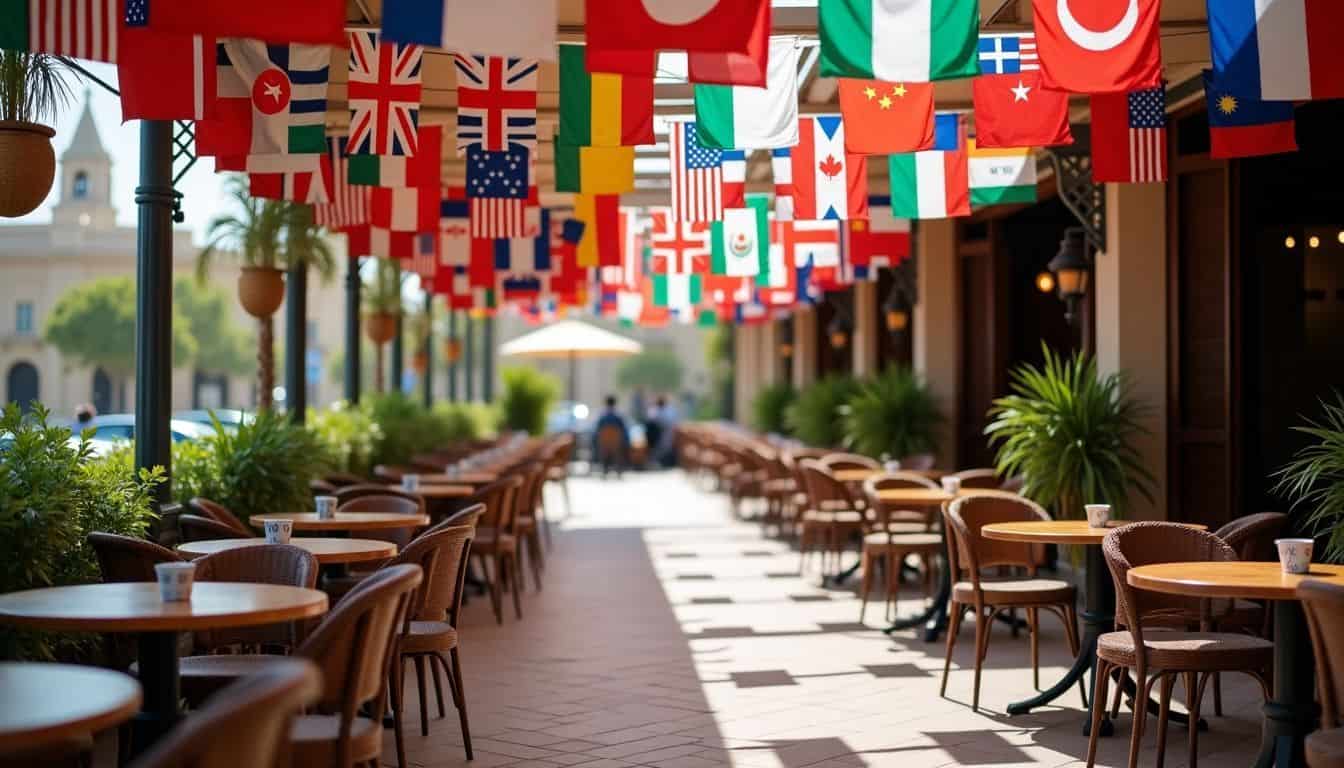
Dubai offers rich social options for expats who want to grow their networks. You can find groups based on shared interests, home countries, or career fields that make settling in much easier.
Expat communities and networks
Expat groups provide crucial support for foreigners adjusting to life in the UAE. They connect newcomers, share local insights, and help build strong friendships.
- Social media communities—like Facebook groups “Expats in Dubai” and “Dubai Expat Community”—link more than 100,000 people. Members share tips about housing, employment opportunities, and fun social activities.
- Professional groups such as AmCham Dubai and British Business Group host regular industry events. Members connect with others in their field, making it easier to grow careers and form valuable contacts.
- Cultural groups, including the German Emirates Club and Indian Social Club, help members celebrate national traditions. These clubs support expats in keeping connections with their cultural roots.
- Sports and fitness clubs offer both exercise and social opportunities. Options range from desert camping adventures to beach volleyball games and dragon boat racing teams.
- Coworking spots such as Hub71 and AstroLabs allow entrepreneurs and remote employees to network easily. These spaces offer a friendly environment for starting new projects or collaborating casually.
- According to Geek Extreme, digital nomads often rely on Dubai’s expat groups for brief stays and finding business contacts.
- Religious organizations across the city—including churches, temples, and mosques—give expats spiritual support and a welcoming community atmosphere.
- Language meetups bring newcomers together with local residents. Participants practice Arabic and English while exchanging cultural stories and experiences.
- The UAE government actively supports expats through local community centers and cultural events held in popular residential neighborhoods.
- Many expat groups share helpful tips about obtaining Emirates ID cards and completing residency paperwork, which simplifies these necessary procedures.
- Women’s associations, such as the Dubai Women’s Association, provide female-focused networking, support, and events around the Emirates.
- Family-friendly clubs help parents with childcare advice, schooling options, and playdates—especially helpful for families settling into life in the UAE.
Social clubs and coworking spaces
Social clubs and coworking spaces make it easy for guys to form strong networks in Dubai. These spots are ideal for meeting other expats and locals, while also keeping your work-life balance intact. Here are some of the best choices to expand your circle:
- MyOffice in Dubai Marina is a favorite coworking space. Professionals gather here daily for networking, enjoying high-speed internet and incredible views of the sea.
- Bisdesk provides freelancers and remote workers with flexible desk spaces or meeting rooms. It’s a great pick for short-term workspace needs.
- The Work Remotely from Dubai visa draws lots of digital nomads to coworking hubs around the city. People meet up regularly in these locations, building both business and personal relationships.
- Dubai Creek Yacht Club offers sailing, dining, and laid-back networking events right by the water—perfect if you’re into boats and a good meal.
- Emirates Golf Club goes far beyond golfing. With a social membership, you gain entry to pools, restaurants, and plenty of fun networking mixers.
- The British Business Group Dubai organizes monthly breakfasts and targeted industry meet-ups. It’s ideal for British expats or anyone doing business linked to UK companies.
- The American Business Council arranges useful workshops, guest-speaker events, and casual social gatherings. It’s an excellent place for Americans to network with local industry leaders.
- Dubai Offshore Sailing Club mixes water sports with active socializing. It’s perfect for men who love sailing, beach cookouts, and meeting new people.
- Dubai International Financial Centre (DIFC) features several high-end coworking spaces popular among banking and finance pros.
- The Dubai Mall is another informal meeting spot. Many expats gather in its cafés to get work done remotely or hold casual discussions.
Tips for meeting new people
Shifting from social clubs to genuine friendships in Dubai requires real effort and strategy. Building personal ties in a global city like Dubai opens doors professionally and socially, boosting your overall experience.
- Join expat community groups to find others with common interests. These groups often plan regular gatherings around Dubai Marina or near Dubai Fountain, providing easy ways to connect casually.
- Attend professional networking events to expand your business connections. Dubai’s job market relies heavily on relationships, and many career opportunities come from personal referrals.
- Connect through LinkedIn and Facebook to tap into Dubai’s active expat networks—ideally before you even arrive in town. Many newcomers land their first friendships within online UAE-focused communities.
- After meeting someone, send a quick, friendly follow-up message. This simple gesture often turns Dubai’s casual interactions into lasting friendships.
- Explore popular activities, such as desert safaris or other local favorites listed in do in Dubai, to mingle with locals and expats. These adventures offer easy conversation starters.
- Master basic greetings in Arabic—a simple step showing respect toward local customs. Dubai’s residents appreciate visitors who take a moment to understand their culture.
- Volunteer your free time with local charity organizations to meet like-minded friends. Dubai has numerous volunteer groups seeking enthusiastic helpers from abroad.
- Check out coworking spaces and their public events, even if you aren’t actively coworking. Many spaces host casual gatherings where professionals meet and chat informally.
- Sign up for hobby-based classes—cooking, fitness, or arts and crafts—to instantly bond with people who share your interests. Learning something new together is naturally bonding.
- Reach out to your existing connections in Dubai and ask them for introductions. Most expats here know how important personal introductions are, and they’re usually happy to help newcomers settle in.
Financial Planning for Expats

Smart money moves in Dubai can set you up for long-term success as an expat. You’ll need to learn about local banks, tax rules, and ways to grow your wealth in this tax-friendly city.
Banking and opening accounts
Opening a bank account in Dubai depends largely on your residency status. Residents typically have a smooth process for opening checking and savings accounts. But non-residents face stricter requirements and higher fees.
For American expats, FATCA compliance creates extra paperwork, causing a longer wait and more hurdles.
To handle money from various countries, choose a bank offering multi-currency accounts. Most major banks in Dubai provide these options, helping you save on exchange rate costs. While the UAE banking system offers decent privacy, it’s not quite at the same level as Swiss banks.
Popular choices for expats include HSBC and Emirates NBD, both known for widespread global access and reliable service in English. To set up your account, bring your Emirates ID, valid passport, current work permit, and proof of your Dubai address.
Banks might also ask for a letter from your employer confirming your monthly salary. Be prepared—the full setup usually needs around one to two weeks before your account is ready.
Most banks also feature easy-to-use mobile apps. These apps are handy for daily banking tasks, saving you from a trip to the branch in Dubai’s intense heat.
Tax policies for expats
Dubai shines among global destinations, thanks to its unbeatable tax perk—a 0% income tax rate. Your paycheck lands in your pocket, untouched by government deductions. With this zero-income tax policy, the city stands apart from most places worldwide.
The UAE applies a territorial tax approach. That means taxes apply strictly to income generated within UAE boundaries. Starting June 2023, the government introduced a corporate tax rate of 9%—but relax, this is only for business profits above AED 375,000.
Most employees won’t feel this change at all.
Even your family’s financial future remains protected here. The UAE doesn’t charge inheritance taxes, so your wealth smoothly passes down to your loved ones. Expats find this detail especially reassuring while planning their estates—no worries about your savings shrinking due to tax bills after you’re gone.
To fully take advantage of your tax-free earnings, you’ll want solid banking systems and smart financial planning. So, it’s worth exploring Dubai’s top savings accounts and investment opportunities available specifically for expats.
Saving and investment opportunities
Making smart financial choices can really help expats build wealth in Dubai, thanks to unique opportunities in a tax-free setting. Here are some practical ways to grow your money in the city:
- Investing in real estate can earn you solid yearly returns—around 5% to 8%—especially in popular neighborhoods like Dubai Marina, making property a reliable choice for long-term growth.
- Local brokerage firms give expats easy access to investing in UAE stocks or global markets, often with fewer hurdles compared to many Western countries.
- Buying gold remains a common investment here, thanks to affordable prices and trustworthy shops—located at the famous Gold Souk or major malls across town.
- Cryptocurrencies are becoming increasingly popular, with trusted platforms such as Binance and BitOasis offering secure buying, selling, and storage of digital currencies in the UAE.
- Banks like Emirates NBD and HSBC offer savings accounts with steady and safe returns—a good spot to keep emergency funds handy.
- I personally found the 30% savings rule effective for budgeting purposes during my five years living in Dubai; setting aside nearly a third of income for savings keeps spending in check.
- Planning for retirement deserves careful attention, since expats usually can’t access public pension systems in the UAE.
- The UAE’s tax-friendly environment means expats pay no personal income tax, capital gains tax, or dividend taxes—making it ideal for wealth accumulation.
- Free zone areas offer attractive business investment possibilities; here, expats can own 100% of their business with fewer regulatory barriers.
- Expert financial advisors familiar with expat situations can clarify investment choices, while also helping you handle tax duties in your home country.
Next up, we’ll explore practical ways to handle Dubai’s luxurious yet scorching lifestyle—including tips for getting through the intense desert heat.
Challenges of Living in Dubai
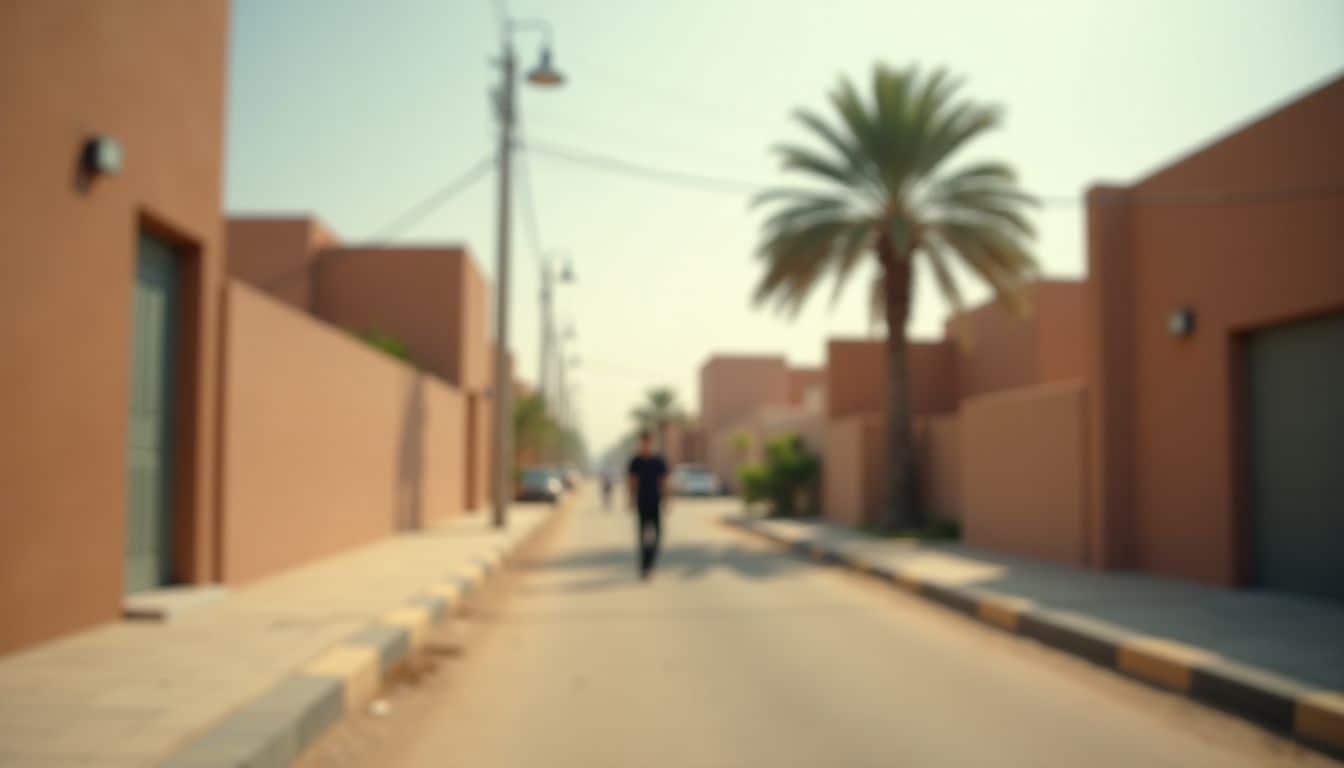
The harsh summer heat, strict internet rules, and cultural norms can test your patience in Dubai, but these hurdles are just part of what makes expat life here such a rich growth journey – read on to learn how to thrive despite these challenges.
Intense heat and climate
Dubai summers hit you like a wall of intense heat—temperatures can easily climb up to 50°C (122°F). From June through September, outdoor activities become almost unbearable. During my first UAE summer, a brief five-minute stroll left me soaked in sweat.
High humidity, combined with scorching heat, creates a steam-room feeling, and this can lead to health issues if you’re not careful. Drinking at least 2 liters of water each day helps keep your body safe in Dubai’s summer climate.
Many expats schedule their vacation time during these hot months, heading off to cooler destinations and returning once temperatures drop.
Protecting your skin from the sun quickly becomes second nature in Dubai’s climate. Even in winter, applying SPF 50 sunscreen every day is essential. Dubai sits near the equator, so strong UV rays hit year-round.
Most expat homes feature powerful air-conditioning units running constantly throughout the summer months. That’s why you’ll notice utility bills rising sharply—make sure you budget extra for electricity during this season.
Outdoor spots such as Dubai Marina and Dubai Fountain have installed misting fans and shaded areas, making visits more comfortable during hot summer days.
Internet censorship
Internet freedom in the UAE sits at a low 30 out of 100, labeled as “Not Free” in 2023. This impacts everyday life in Dubai, placing strict controls on your online experience. The UAE’s Telecom and Digital Government Regulatory Authority (TDRA) closely monitors and restricts internet usage.
Many familiar apps from your home country are blocked—popular services like WhatsApp voice calls or Viber won’t connect here. Expats often feel the frustration of losing simple ways to chat with family and friends.
To get around these limits, many residents use paid VPN services—but these fall into uncertain legal territory under Islamic law. Over time, self-censorship online becomes second-nature—you quickly learn which topics are off-limits.
Your Emirates ID connects directly to your internet activities, meaning certain online posts can land you in genuine legal trouble.
Cultural and legal restrictions
Dubai follows Islamic law, with clear guidelines about couples living together. Men should understand that sharing a home with an unmarried partner is illegal. This rule often surprises expats who move to the UAE without knowing local laws.
Authorities treat violations seriously—fines or harsher penalties can result.
Public behavior has limits, too. Showing affection, like kissing or hugging in public, may draw unwanted attention from law enforcement. Dressing modestly is expected for both men and women—in malls, streets, and other shared spaces.
Always carry your Emirates ID card with you; authorities may ask to see it as proof you’re legally allowed here. Dubai offers residents many personal freedoms, but respecting local customs and laws helps expats stay trouble-free.
How Will Expat Life in Dubai Evolve in 2025?

Life for expats in the UAE will look different by 2025, all thanks to the Dubai Economic Agenda D33. The plan targets doubling the economy by 2033, opening job opportunities in tourism, real estate, AI, logistics, and fintech.
Foreign investment projects continue to grow rapidly, offering a stronger job market for expats arriving here. During my stay, I’ve noticed how the city constantly evolves and strives to remain ahead—always adding something new.
Even processes like the Emirates ID application keep getting simpler and quicker, and visa choices now cover a wider variety of lifestyles.
Sure, living costs could climb a bit, but salaries in expanding industries will likely keep pace. Housing options around neighborhoods like Dubai Marina or newer developments will provide smarter, tech-friendly homes.
Schools under KHDA supervision will probably include more support programs for students with special educational needs. Most expats I’ve spoken to seem thrilled by these upgrades, especially the city’s commitment to innovation—making daily life smoother and less stressful.
For more information, hop over to https://emirates.estate/ today.
People Also Ask
What is the cost of living in Dubai for expats in 2025?
Living costs for expats in Dubai depend mostly on your choice of lifestyle. Housing in trendy spots, like Dubai Marina, is pricier than in Sharjah or Ajman. Daily basics, tuition fees for schools like GEMS Education or KHDA-approved institutions, and healthcare costs also add up quickly—so factor these into your budgeting.
How do I get an Emirates ID when relocating to Dubai?
You’ll need an Emirates ID if you’re moving to Dubai—it officially proves your legal status as a UAE resident. To get this card, submit your passport, birth certificate, and sometimes your driver’s license. The application process is straightforward, so just have the paperwork ready.
What should I know about Dubai’s job market before moving?
The job market in Dubai is highly competitive yet offers attractive salaries without income tax or capital gains taxes. Companies bounced back quickly after COVID-19, boosting job opportunities in popular sectors like tourism, technology, and finance. With the UAE economy steadily expanding, employment prospects look bright.
Are there cultural rules I should follow in Dubai?
Cultural rules definitely matter in Dubai—which follows Islamic guidelines closely. Public swearing, selling drugs, or openly showing affection can land you with fines, or worse. Serious crimes might even have severe punishments, including the death penalty. Be especially mindful of customs during Ramadan to stay trouble-free.
How does the tenancy system work in Dubai?
Paying rent in Dubai typically means providing the landlord with post-dated checks for the whole year. Real estate agents are helpful, but expect some additional fees. Your rental agreement outlines your rights clearly, yet landlords are allowed to increase rent by fixed percentages every year—so keep this in mind.
What transportation options exist beyond Dubai International Airport?
Dubai offers convenient, modern Metro connections across key areas. Taxis are easily available and affordable, too. Quite a few expats choose to buy cars since fuel is significantly cheaper than in Europe. If you plan to drive, a trip from Dubai to Ras Al Khaimah usually takes around 90 minutes.
References
- https://infibiz.ae/cost-of-living-in-dubai-2025-expenses-salaries-lifestyle-insight/
- https://www.linkedin.com/pulse/cost-living-dubai-expats-what-you-need-know-2024-25-ifzauae-lusve
- https://clearheadconsultants.com/blog/buying-vs-renting-in-dubai-whats-better-in-2025/ (2025-01-22)
- https://www.matutto.com/dubai-guide/best-neighbourhoods
- https://www.researchgate.net/publication/324401018_Land_urban_form_and_politics_A_study_on_Dubai%27s_housing_landscape_and_rental_affordability (2024-10-22)
- https://shozon.com/blog/job/popular-industries-for-expat-jobs-in-dubai/
- https://nnroad.com/blog/dubai-work-culture/
- https://www.csgtalent.com/insights/blog/live–work-and-explore-dubai—insights-into-dubai-s-culture-and-career-prospects/
- https://www.qureos.com/career-guide/uae-visa-guide-for-employees (2025-01-22)
- https://www.pacificprime.ae/blog/guide-to-education-system-in-dubai-for-expat-families/?amp
- https://www.researchgate.net/publication/327720408_Cost_of_Education_in_Dubai (2018-09-18)
- https://www.researchgate.net/publication/229888677_Special_needs_education_in_the_United_Arab_Emirates_UAE_A_systems_perspective
- https://www.pacificprime.ae/blog/public-and-private-healthcare-uae/
- https://www.discovered.ae/blog/2024/08/mini-series-part-1-your-essential-guide-to-medical-insurance-in-dubai-before-relocating
- https://www.allocationassist.com/20-reasons-for-relocating-to-dubai-in-2024/
- https://www.flipflopwanderers.com/cultural-differences-dubai/
- https://www.commisceo-global.com/resources/country-guides/uae-guide
- https://www.internationalcitizens.com/blog/expatriate-living/dubai-laws-expats.php
- https://www.damacproperties.com/en/blog/uae-ranked-second-safest-country-the-world-2025-heres-why-it-matters-2378
- https://www.expatica.com/ae/living/gov-law-admin/womens-rights-in-the-united-arab-emirates-71118/
- https://pmc.ncbi.nlm.nih.gov/articles/PMC8585940/
- https://www.researchgate.net/publication/348334227_The_Positive_Role_of_the_Tourism_Industry_for_Dubai_City_in_the_United_Arab_Emirates
- https://papers.ssrn.com/sol3/Delivery.cfm/SSRN_ID3846865_code1916347.pdf?abstractid=3846865&mirid=1
- https://nomadcapitalist.com/expat/living-in-dubai-uae-an-expat-guide/ (2025-02-24)
- https://www.linkedin.com/pulse/creating-supportive-ecosystem-expat-success-uae-relocate-mena-edacf
- https://ler.illinois.edu/2024/05/14/sebastian-aviles-expat-adventures/ (2024-05-14)
- https://mydubailifestyle.com/top-7-expat-networking-tips-for-thriving-in-dubai/
- https://www.rediscovering-emily.com/blog/meeting-new-people-expat
- https://www.nestmann.com/how-to-open-a-bank-account-dubai
- https://www.globalcitizensolutions.com/taxes-in-uae/ (2025-02-10)
- https://brysona.com/financial-planning-in-dubai/
- https://www.april-international.com/en/long-term-international-health-insurance/guide/coping-with-dubais-high-temperature-and-extreme-weather-as-an-expat
- https://freedomhouse.org/country/united-arab-emirates/freedom-net/2023
- https://www.shipit.co.uk/blog/guides/pros-and-cons-of-life-in-dubai
- https://magellan.mu/en/2024/10/14/dubai-in-2025-the-ultimate-guide-for-ambitious-expatriates/

